Pope Francis: “We cannot settle for a marginal or private faith”
In his speech to the participants in the closing session of the 50th Social Week of Catholics in Italy, Pope Francis used an image that sums it all up and that the organizers of this event chose as a symbol of this event: the heart
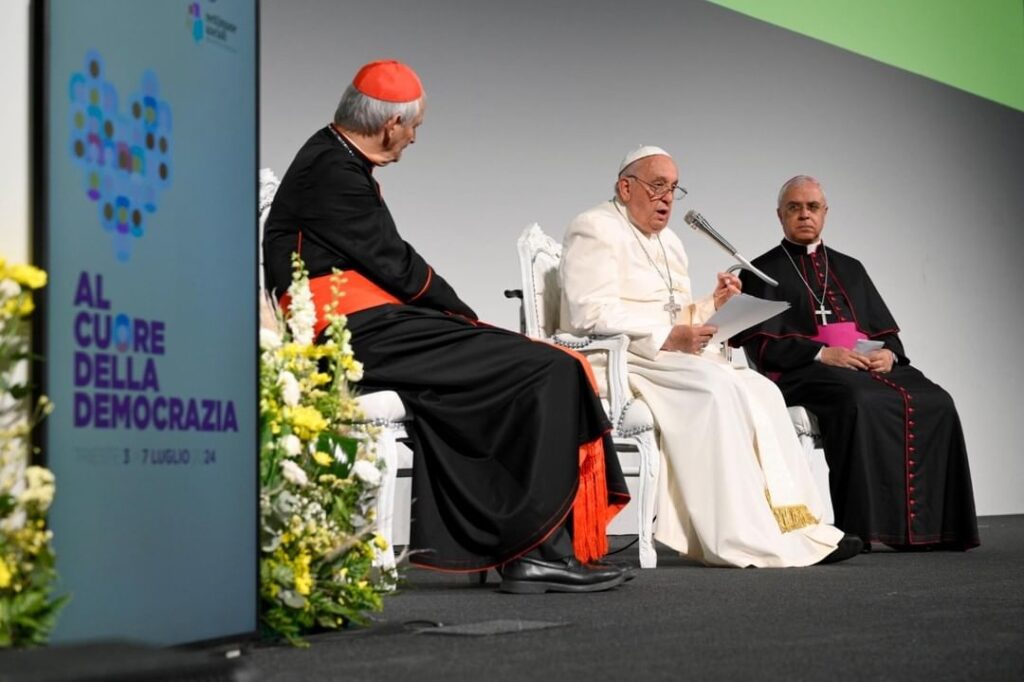
Heal hearts and put creativity into practice with political participation.
After taking off this morning at 6:30 from the Vatican heliport bound for Trieste, where he arrived after an hour and a half of flight, the Holy Father held his first public meeting at 8:30 at the Congress Center of this Italian city, with the participants in the closing session of the 50th Social Week of Catholics in Italy.
A Church sensitive to changes in society
In his speech, Pope Francis began by thanking the bishops and authorities for their invitation and highlighted the history of these “Weeks”, which “is intertwined – he said – with the history of Italy, and this already says a lot: it speaks of a Church sensitive to changes in society and committed to contributing to the common good.”
“From this experience, you have wanted to explore a very topical topic: ‘At the heart of democracy. Participate between history and the future”
 The Pontiff recalled Blessed Giuseppe Toniolo, to whom this initiative that began in 1907 is owed, and affirmed that democracy can be defined as “that civil order in which all social, legal and economic forces, in the fullness of their hierarchical development , they cooperate proportionally to the common good, reverting in the final result to the predominant benefit of the lower classes.”
The Pontiff recalled Blessed Giuseppe Toniolo, to whom this initiative that began in 1907 is owed, and affirmed that democracy can be defined as “that civil order in which all social, legal and economic forces, in the fullness of their hierarchical development , they cooperate proportionally to the common good, reverting in the final result to the predominant benefit of the lower classes.”
“In light of this definition, it is evident that democracy is not in good health in today’s world. This interests and worries us, because the good of man is at stake, and nothing that is human can be alien to us.”
Francis highlighted that “the democratic order matured in Italy after the Second World War, thanks also to the decisive contribution of Catholics.” And he added:
“We can be proud of this history, which was also influenced by the experience of the Social Weeks; and, without mythologizing the past, we must learn from it to assume the responsibility of building something good in our time.”
He also alluded to the Pastoral Note with which the Italian episcopate reestablished the Social Weeks in 1988, with the objectives of “giving meaning to the commitment of everyone in the transformation of society; pay attention to people who are left out or marginalized from the winning economic processes and mechanisms; give space to social solidarity in all its forms; support the return of a caring ethic of the common good […]; give meaning to the development of the country, understood […] as a global improvement in the quality of life, of collective coexistence, of democratic participation, of authentic freedom”.
Vision rooted in the Social Doctrine of the Church
Of this vision, “rooted in the Social Doctrine of the Church,” the Pope said that “it encompasses some dimensions of Christian commitment and an evangelical reading of social phenomena that are not only valid for the Italian context, but represent an exhortation for the entire human society and the path of all peoples.”
“In fact, just as the crisis of democracy is transversal to different realities and nations, in the same way the attitude of responsibility towards social transformations is a call addressed to all Christians, wherever they are living and working, in all the parts of the world”
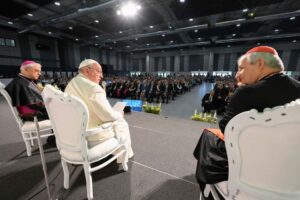 The Pontiff used an image that sums it all up and that the organizers of this event chose as a symbol of this event: the heart. Hence, the Pope proposed two reflections to nourish the path ahead:
The Pontiff used an image that sums it all up and that the organizers of this event chose as a symbol of this event: the heart. Hence, the Pope proposed two reflections to nourish the path ahead:
In the first, we can imagine the crisis of democracy as a wounded heart. What limits participation is before our eyes. If corruption and illegality show a “wounded” heart, the various forms of social exclusion should also worry us.
“Whenever someone is marginalized, the entire social body suffers. The throwaway culture draws a city where there is no place for the poor, the unborn, the fragile, the sick, the children, the women, the young.”
He also added that “Aldo Moro recalled that a State is not truly democratic if it is not at the service of man, if it does not have as its supreme goal the dignity, freedom and autonomy of the human person, if it is not respectful of those social formations in “in which the human person develops freely and in which he integrates his personality.”
“The very word ‘democracy’ does not simply coincide with the vote of the people, but requires that the conditions be created so that everyone can express themselves and participate”
Human life and the dignity of the person
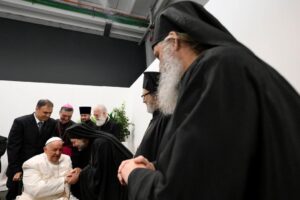 The Pope also told them that “participation is not improvised: it is learned as a child, as a young person, and it must be ‘trained’, even in a critical sense with respect to ideological and populist temptations.” And in this perspective, as he himself had the opportunity to recall a few years ago, during his visit to the European Parliament and the Council of Europe, he stated that “it is important to highlight the contribution that Christianity can make today to cultural and European social society in the context of a correct relationship between religion and society, promoting a fruitful dialogue with the civil community and political institutions so that, by enlightening each other and freeing ourselves from the dross of ideology, we can begin a common reflection, especially on the issues related to human life and the dignity of the person.”
The Pope also told them that “participation is not improvised: it is learned as a child, as a young person, and it must be ‘trained’, even in a critical sense with respect to ideological and populist temptations.” And in this perspective, as he himself had the opportunity to recall a few years ago, during his visit to the European Parliament and the Council of Europe, he stated that “it is important to highlight the contribution that Christianity can make today to cultural and European social society in the context of a correct relationship between religion and society, promoting a fruitful dialogue with the civil community and political institutions so that, by enlightening each other and freeing ourselves from the dross of ideology, we can begin a common reflection, especially on the issues related to human life and the dignity of the person.”
To this end, the principles of solidarity and subsidiarity continue to be fruitful. Because a people is held together by the ties that constitute it, and the ties are strengthened when each one is valued. Democracy always requires moving from partisanship to participation, from “ovation” to dialogue.
“As long as our socioeconomic system continues to produce a victim and there is one discarded, the festival of universal brotherhood cannot be celebrated”
“Everyone – Francisco also said – must feel part of a community project; no one should feel useless. Certain forms of welfare that do not recognize the dignity of people are social hypocrisy. And indifference is a cancer for democracy.”
Let democracy look like a healed heart
The second reflection of the Bishop of Rome focused on encouraging participation so that democracy resembles a healed heart. “And for this – he said – you have to exercise creativity.”
If we look around us, we see so many signs of the action of the Holy Spirit in the lives of families and communities. Even in the fields of economics, technology, politics, society. “Let us think – the Pope continued – of those who have made room for people with disabilities in a company; in workers who have waived one of their rights to avoid the dismissal of others; in renewable energy communities that promote integral ecology, also taking care of families in situations of energy poverty; in administrators who promote birth rates, employment, schools, educational services, accessible housing, mobility for all and the integration of migrants.”
“Fraternity makes social relationships flourish and, on the other hand, caring for others requires the courage to consider ourselves as a people”
The Pope also said that unfortunately, the category “people” is often misinterpreted, which could lead to the elimination of the very word “democracy” (“government of the people”). However, to affirm that society is something more than the mere sum of individuals, the term ‘people’ is necessary.
“A democracy with a healed heart continues to cultivate dreams for the future, is committed to people, and demands personal and community involvement”
Let’s not be fooled by easy solutions
Let’s not be fooled by easy solutions. Let us commit ourselves, instead, to the common good. Let us not manipulate the word democracy or distort it with empty titles capable of justifying any action. Democracy is not an empty box, but is linked to the values of the person, fraternity and integral ecology
As Catholics, in this horizon, we cannot settle for a marginal or private faith. This means not so much demanding to be heard, but, above all, having the courage to raise proposals for justice and peace in public debate. We have something to say, but not to defend privileges. We must be a voice that denounces and proposes in a society that is often voiceless and in which too many do not have a voice.
This is political love, which is not content with treating the effects, but rather seeks the causes. It is a form of charity that allows politics to live up to its responsibilities and move away from polarizations, which impoverish and do not help to understand and confront challenges. The entire Christian community is called to this political charity, in the distinction of ministries and charisms.
“Let us train ourselves to this love, to make it circulate in a world lacking in civic passion. Let us learn more and better to walk together as the people of God, to be a leaven of participation among the people of which we are a part”.
“Organizing hope”
In conclusion, the Pope’s invitation to the Italian Catholic laity, following the example of Giorgio la Pira, was to nurture good political projects capable of rekindling hope. Francis indicated a work horizon, facing the next Jubilee, inviting to promote initiatives for the political and social training of young people, offering spaces for confrontation and dialogue, and favoring synergies for the common good.
“Let us never stop nurturing trust, certain that time is superior to space and that initiating processes is wiser than occupying space… This is the role of the Church: to commit to hope, because without it manages the present, but does not build the future”
“I bless you – concluded the Pope – and I wish you to be artisans of democracy and contagious witnesses of participation.”
Related
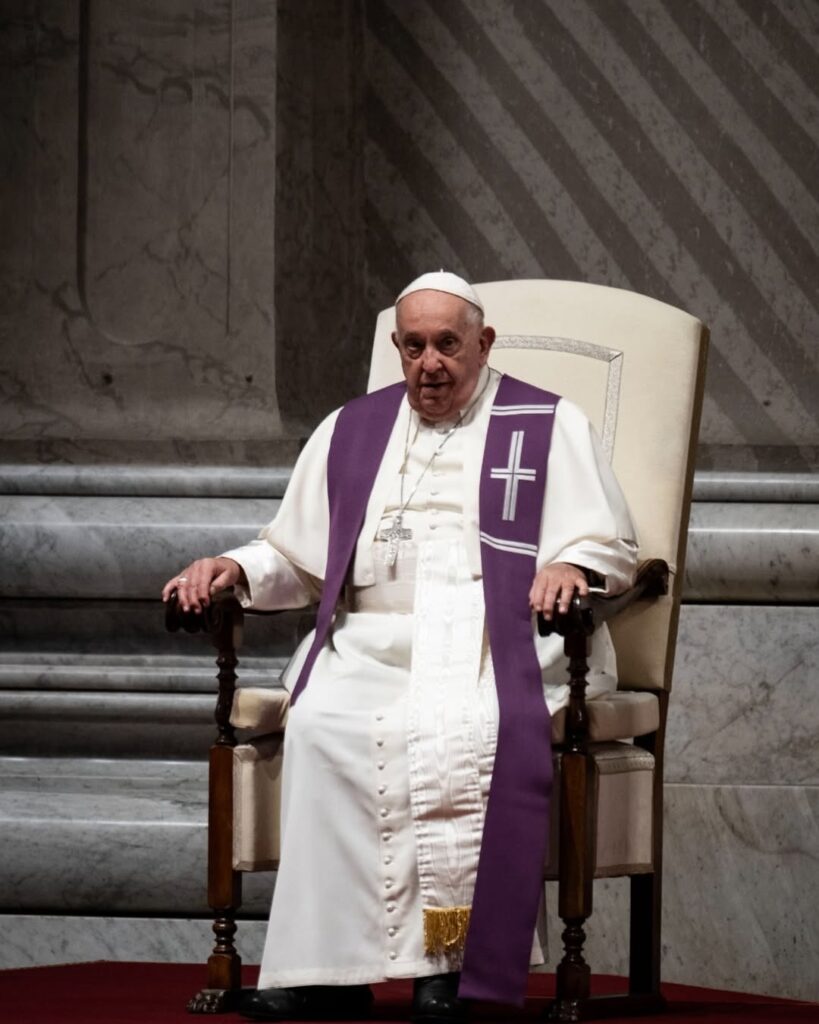
You Didn’t Give Up
Exaudi Staff
23 April, 2025
2 min
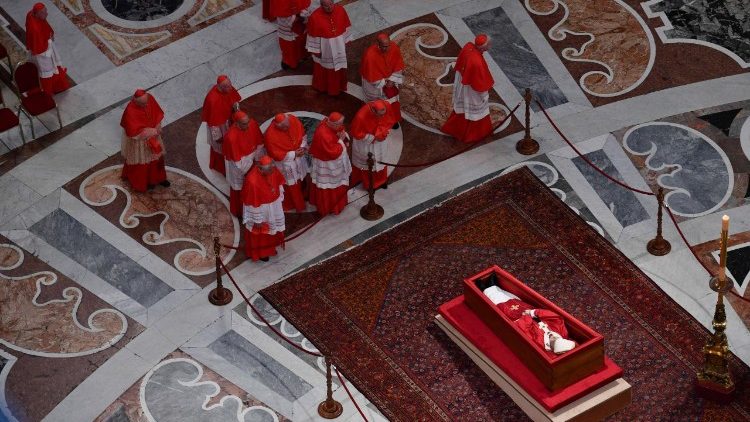
“We have experienced a brilliant pontificate that has touched the hearts of believers and non-believers alike”
Exaudi Staff
23 April, 2025
6 min
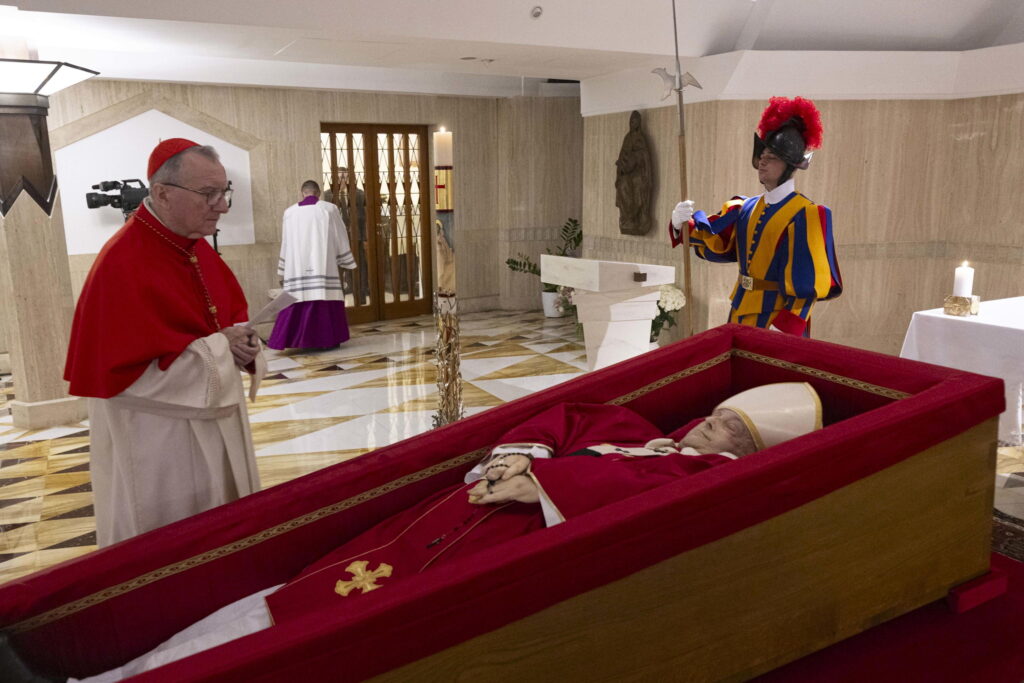
Funeral of Pope Francisco on April 26th in the Plaza de San Pedro
Exaudi Staff
23 April, 2025
3 min

“You give us hope and remind us that God does not forget us” importa
Exaudi Staff
22 April, 2025
5 min
 (EN)
(EN)
 (ES)
(ES)
 (IT)
(IT)

